Israeli academia during the genocide. La universidad israelí en el genocidio ENG ESP

Supporting the state through words and silences. Apoyo al gobierno, activo y pasivo.
ENGLISH
Academic institutions are expected to be liberal, inclusive and safe spaces for diverse ideas and opinions. Another great expectation is to provide evidence-based, intellectual and humanitarian feedback to the state to keep its potential abuse of power in check. The intense year of conflict in Israel and Gaza eventually turned into an undeniably state-sponsored genocide and yet the academic community in Israel, including majority of public health academia, decided to ignore it and bowed down to hyper-nationalistic sentiments without examining them.
The ten stages of genocide described by Gregory Stanton essentially indicate the role of human-choice and bystander-indifference in genocides [10]. Israeli academia seemed to reflect both. Academics in public health were expected to act as neutral mediators, fostering discussions rooted in ethics and a commitment to human welfare amidst one of the greatest humanitarian crises of the 21st century. Their role demanded advocating for humanitarian solutions, highlighting the health crises in Gaza, prioritising the protection of civilian lives and examining their state’s action under the lens of war-crimes. However, many prominent academics ignored their responsibilities and aligned with state propaganda, endorsing discriminatory narratives, and failing to criticise the destruction of Gaza’s health system and the deliberate targeting of health workers. This silence from public health academia betrayed the foundational principle of advocating for marginalised populations and addressing health inequities while also ignoring the principle of respect for life and dignity that is central to public health ethics. Rather than promoting peace and fostering evidence-based solutions, many academics contributed to polarisation and a dehumanised discourse, abandoning their responsibility to use knowledge as a bridge for dialogue and make efforts toward reconciliation. Belonging to a country of people who suffered a brutal genocide under the Nazi rule in the 1940s, academia failed terribly to identify a brewing genocidal sentiment in their own community and subsequently, failed to prevent it.
As an international student in Israel during an extraordinary year, I was often compelled to choose between two things: feeling gratitude towards the country that was giving me the best resources to study public health and opportunity to engage with some of the best professors in the world and be quiet; or have a shot at discussing a tragedy that was happening a few miles from my residence in the university campus at the risk of annoying some influential figures with no immunity of my own. While both could have happened in a “truly free” educational campus where conflicting ideas were safeguarded, I was often left suffocating in my own thoughts and feelings as the crises in Gaza became unbearable. It often made me think that perhaps even the best educational curriculum can be limited to a glorification of skills and technology and be so devoid of humanitarian values that its institutional guardians are useless when they are expected to stand up for truth and justice. It should also be noted that academia in Israel did not contribute to a speedy return of its own citizens from Hamas’s captivity either and often kept blaming the same international laws their own state was twisting to inflict a genocide.
The one learning out of many that I take from this experience is: the best intellect and education can serve violence, if not rooted in empathy and equipped with the ability to critically examine its own actions in peaceful times.
Note: Zionism is an ethnic nationalist movement that emerged in Europe in the late 19th century which aimed to establish a national home for the Jewish people, which was achieved by the colonisation of Palestine, a region roughly corresponding to the Land of Israel in Judaism, with central importance in Jewish history. Contrary to a common notion, Zionism, Semitism and Judaism are not synonymous.
All the academic support that was lent to the Israeli government made for a dehumanised, discriminatory perspective against the Palestinians. This was also evident in the informal interactions with Israeli medical students which revealed a great lack of sensitivity for loss of civilian lives and destruction of health services in particular. Some of the notable expressions about the people of Gaza as were noted by me in personal interactions are:
“Those animals are in no way innocent.”
“They should have thought of consequences before supporting and sheltering Hamas.”
“Healthcare is for humans, not for terrorists.”
“They should all have evacuated long ago; that’s not their piece of land.”
“The world will always hate Jews no matter what we do, so we will just do whatever it takes to kick them (the Palestinians) out.”
However, though these interactions were limited, and their findings should not be generalised, they definitely show an absence of objectivity with strong support to the state’s propaganda.
ESPAÑOL
Se espera que las instituciones académicas sean espacios liberales, inclusivos y seguros para la diversidad de ideas y opiniones. Otra gran expectativa es brindar retroalimentación intelectual, humanitaria y basada en la evidencia al Estado para controlar su potencial abuso de poder.
El intenso año de conflicto en Israel y Gaza finalmente se convirtió en un genocidio innegablemente patrocinado por el Estado; sin embargo, la comunidad académica israelí, incluida la mayoría del mundo académico de la salud pública, decidió ignorarlo y se sometió a sentimientos hipernacionalistas sin examinarlos.
Las diez etapas del genocidio descritas por Gregory Stanton indican esencialmente el papel de la elección humana y la indiferencia del espectador en los genocidios [10]. El mundo académico israelí parecía reflejar ambos. Se esperaba que los académicos de la salud pública actuaran como mediadores neutrales, fomentando debates basados en la ética y el compromiso con el bienestar humano en medio de una de las mayores crisis humanitarias del siglo XXI. Su función exigía abogar por soluciones humanitarias, visibilizar la crisis sanitaria en Gaza, priorizar la protección de la vida de los civiles y examinar la actuación de su Estado desde la perspectiva de los crímenes de guerra.
Sin embargo, muchos académicos prominentes ignoraron sus responsabilidades y se alinearon con la propaganda estatal, respaldando narrativas discriminatorias y omitiendo criticar la destrucción del sistema de salud de Gaza y los ataques deliberados contra el personal sanitario. Este silencio del mundo académico de la salud pública traicionó el principio fundamental de defender a las poblaciones marginadas y abordar las desigualdades en salud, a la vez que ignoraba el principio de respeto a la vida y la dignidad, fundamental para la ética de la salud pública. En lugar de promover la paz y fomentar soluciones basadas en la evidencia, muchos académicos contribuyeron a la polarización y a un discurso deshumanizado, abandonando su responsabilidad de utilizar el conocimiento como puente para el diálogo y promover la reconciliación. Pertenecientes a un país que sufrió un brutal genocidio bajo el régimen nazi en la década de 1940, el mundo académico fracasó rotundamente a la hora de identificar un sentimiento genocida que se gestaba en su propia comunidad y, posteriormente, no logró prevenirlo.
Como estudiante internacional en Israel durante un año extraordinario, a menudo me vi obligado a elegir entre dos cosas: sentir gratitud hacia el país que me brindaba los mejores recursos para estudiar salud pública y la oportunidad de interactuar con algunos de los mejores profesores del mundo y guardar silencio; o intentar hablar sobre una tragedia que ocurría a pocos kilómetros de mi residencia, en el campus universitario, a riesgo de molestar a figuras influyentes sin mi propia inmunidad. Si bien ambas cosas podrían haber sucedido en un campus educativo "verdaderamente libre" donde se protegieran las ideas contradictorias, a menudo me asfixiaba en mis propios pensamientos y sentimientos mientras la crisis en Gaza se volvía insoportable. A menudo me hacía pensar que quizás incluso el mejor currículo educativo puede limitarse a glorificar las habilidades y la tecnología, y estar tan desprovisto de valores humanitarios que sus guardianes institucionales son inútiles cuando se espera que defiendan la verdad y la justicia.
Cabe señalar también que el mundo académico en Israel tampoco contribuyó al rápido regreso de sus ciudadanos del cautiverio de Hamás y, a menudo, culpó a las mismas leyes internacionales que su propio Estado tergiversaba para infligir un genocidio. La lección, entre muchas, que extraigo de esta experiencia es: el mejor intelecto y la mejor educación pueden contribuir a la violencia, si no se basan en la empatía y se les dota de la capacidad de examinar críticamente sus propias acciones en tiempos de paz.
Nota: El sionismo es un movimiento nacionalista étnico que surgió en Europa a finales del siglo XIX y cuyo objetivo era establecer un hogar nacional para el pueblo judío, lo cual se logró mediante la colonización de Palestina, una región que corresponde aproximadamente a la Tierra de Israel en el judaísmo y tiene una importancia central en la historia judía. Contrariamente a la idea común, sionismo, semitismo y judaísmo no son sinónimos.
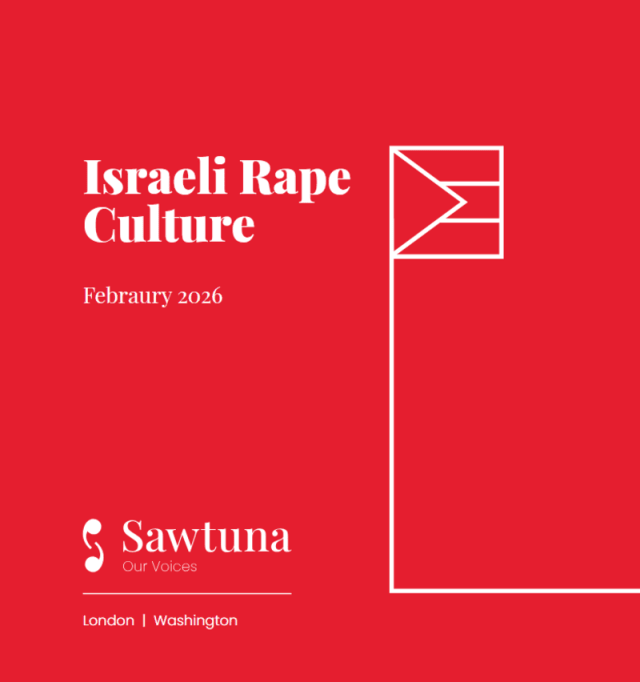
Israeli rape culture. Cultura israelí de la violación sexual. ENG ESP
Zionism is inherently imbued with rape culture. El sionismo como cultura de la violación
Publicado hoy.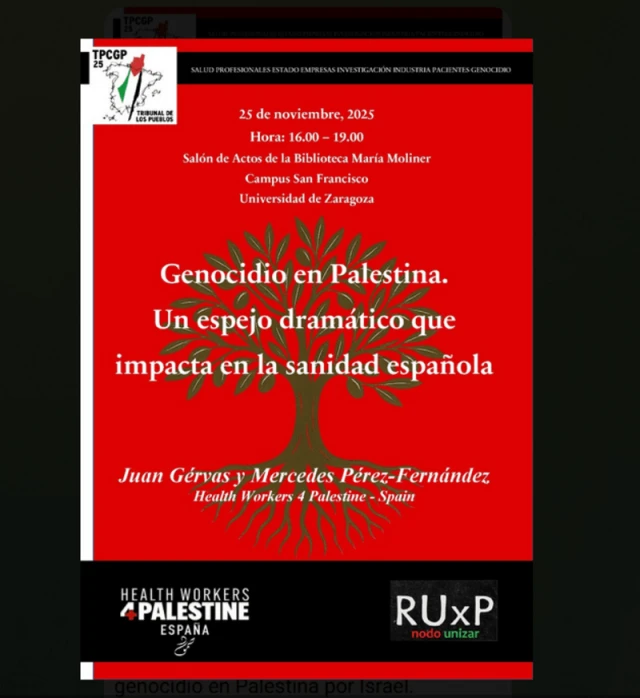
Vídeo. "Genocidio en Palestina. Un espejo dramático que impacta en la sanidad española" Vídeo 90 min
Encuentro en Zaragoza, preparación para el Tribunal de los Pueblos sobre la Complicidad con el Genocidio palestino en el Estado español TPCGP-25.
Publicado hace 2 días.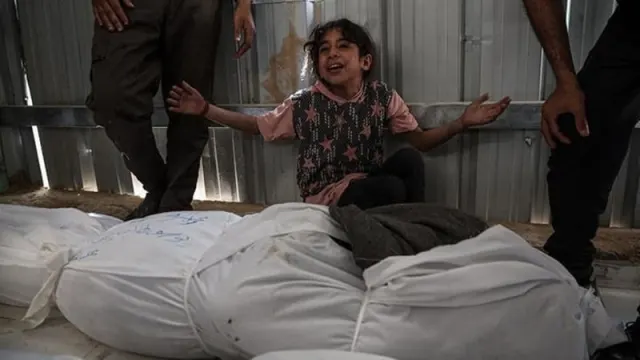
Gaza’s Orphan Crisis: 40,000. En Gaza, 40.000 huérfanos ENG ESP
40,000 children after losing one or both parents. 40.000 niños en Gaza sin uno o dos padres
Publicado hace 7 días.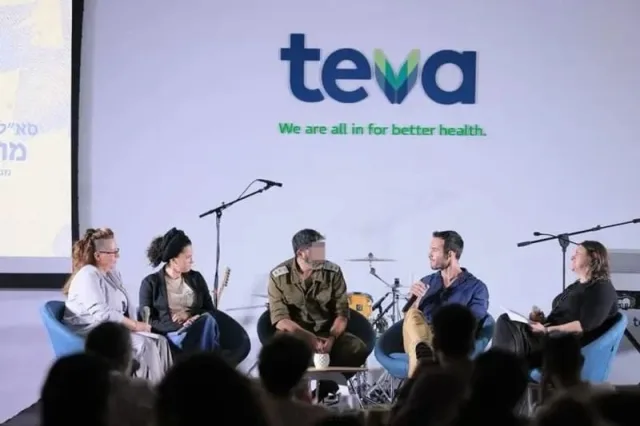
Teva y el ejército de Israel (IDF). Teva and the Israel Defense Forces (IDF). ESP ENG
Teva apoya directamente el genocidio palestino. Teva directly supports the genocide against Palestinians.
Publicado hace 14 días.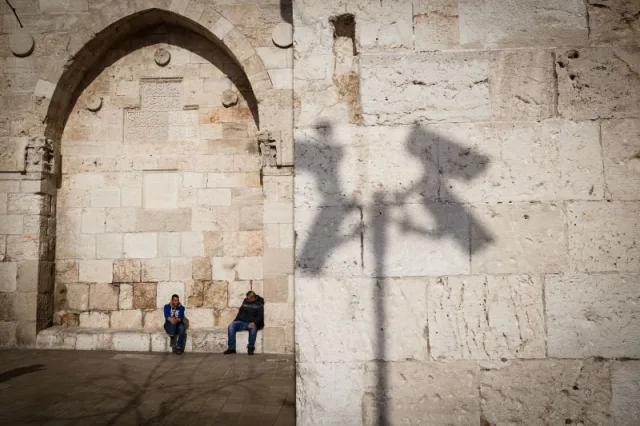
ICE operations (USA) versus Israel occupation of Gaza. EEUU, policía de inmigración versus Israel ocupación de Gaza. ENG ESP
“Imperial-colonial boomerang” in action. El «bumerán imperial-colonial» en acción
Publicado el 13 de febrero.
Teva, growing global backlash. Teva, boicot creciente ENG ESP
Teva: politics and business over compassion and ethics. Teva: política y negocio sobre compasión y ética
Publicado el 10 de febrero.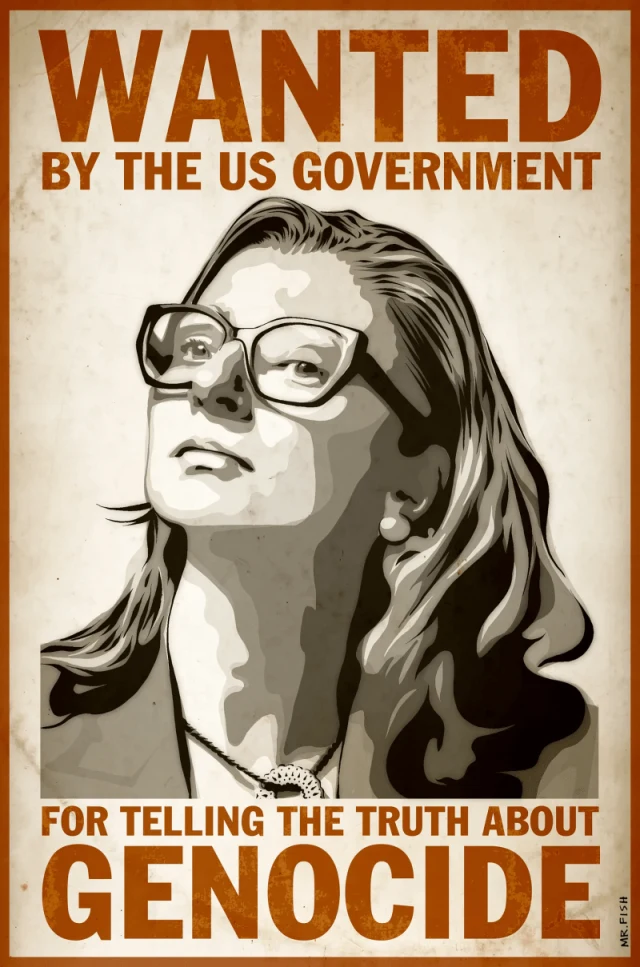
"Si Francesca Albanese es terrorista, yo también". "If Francesca Albanese is a terrorist, then so am I" ESP ENG
"Una relatora de derechos humanos de la ONU, tratadа como terrorista por documentar el genocidio en Gaza". "A UN human rights rapporteur, treated as a terrorist for documenting the genocide in Gaza"
Publicado el 9 de febrero.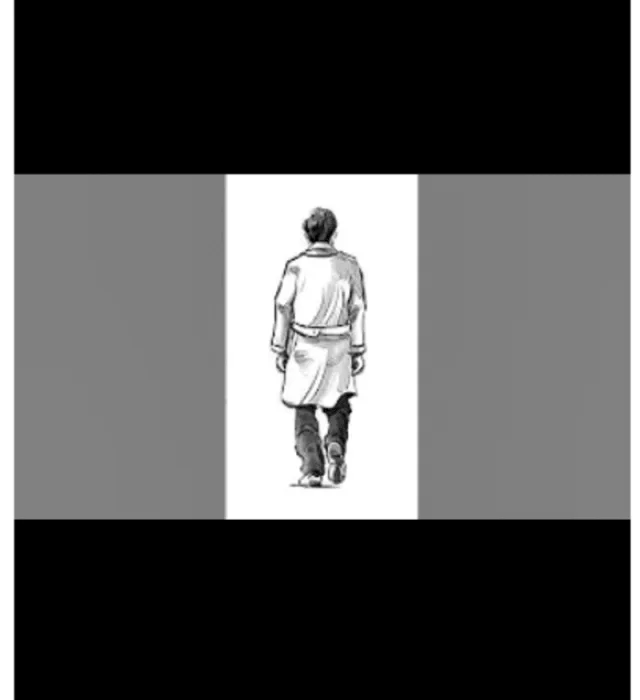
Vídeo, 60 sg. Dr. Hussam Abu Safiya. Lazos Rojos por la liberación de rehenes palestinos.
Campaña por la liberación de rehenes palestinos
Publicado el 7 de febrero.Ver más / See more


